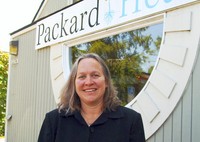Executive Profile: Kimberly Kratz, executive director, Packard Health

Kimberly Kratz
Sarah Rigg | for AnnArbor.com
Kratz was hired as executive director of Packard Health in Ann Arbor in 2007 after working for more than a decade at Migrant Health Promotion, a national nonprofit organization for farm workers' health advocacy with one office on the Texas-Mexico border and another in Saline.
“I never thought of shifting my focus from national to local as somehow ‘smaller.’ People can do local work with a big national impact,” she said. “Local work that we do at Packard Health can impact the nation by providing a model.”
Kratz said she became interested in health care out of a passion for social justice, and that is reflected in her career. As part of her work toward a master’s degree, she interned in Mexico studying the reproductive health of women who worked in “maquiladoras” — Mexican factories — and studying causes for low birth weight among these women. That led to her work with Migrant Health Promotion, where she served as executive director for 17 years.
“What I did at the time and what they continue to do is teach migrant farmers to be health promoters in the camps and communities,” she said. Educators go into a camp of migrant farm workers and teach them “a skill set that remains in the community.”
Those health promoters then can help other workers figure out when work conditions are dangerous, what their health care rights are and how to exercise them.
Kratz said she loved the work, but with two school-aged children, she wanted a job where she didn’t have to travel as much. The position at Packard Health seemed like a great opportunity to continue her work for social justice while having a more stable family life.
“Packard's mission is to provide access and care for everyone, including people who have limited access because of cultural, financial and social conditions,” she said. “That’s clearly a social justice direction.”
Kratz said the main challenge when she came on board was moving Packard from an organization that was widely associated with its “dedicated and charismatic founders” to an organization that was “owned” by the community.
Since her arrival, Packard has established a new practice in another part of town, Packard Health West, and the board of trustees set a goal to double the size of Packard Health’s practice over 10 years.
The next big goal, she said, is to become a “federally qualified health center.”
Kratz said the board and staff of Packard Health had already considered applying for the FQHC designation, but recent health care changes have “sweetened the pot.”
“We’d receive a subsidy from the federal government in exchange for agreeing to be accessible to the community regardless of the ability to pay,” she said.
Kratz said Packard Health is in a good position to apply because they’re already doing many of the things required to be designated an FQHC, such as offering sliding scale fees, having patients on the board of directors and providing public health outreach programs.
Some of those public health programs include partnering with Food Gatherers to provide a food pantry to low-income patients and offering community education on how to manage chronic conditions such as diabetes and asthma.
“What Packard does, and the reason I’m here, is that I have a lot of passion for prevention and for interventions that help the entire community,” she said. “We address health disparities, primarily access to health care. Patients are treated well here regardless of whether they have insurance.”
She said the hard data on Packard’s effectiveness is encouraging. “In terms of the share of patients screened for breast, colon and cervical cancer, we are doing a good job with preventative care.”
She added that comparisons with other health care providers show that Packard doctors are effective in helping patients take control of chronic health issues.
“Packard doctors do a wonderful job,” she said. “I, personally, am data-driven, and that’s what I like to see.”
Background
Age: 49.
Education: Master’s degree in public health and master's in social work, University of Michigan.
Family: Nyeli (9) and Zak (5).
Residence: Ann Arbor.
Business Insights
Best business decision: Seeking diversity and large grants.
Worst business decision: I am always learning.
Best way to keep a competitive edge: Embrace data, demonstrate return on investment.
Personal hero: Vera Champine, my grandmother, and Barack Obama.
How do you motivate people? Expect excellence and listen hard.
What advice would you give to yourself in college? Take it easy.
Word that best describes you: Risk-taker.
First Web site you check in the morning: AnnArbor.com.
Confessions
What keeps you up at night? Packing lunches and doing laundry.
Pet peeve: Back seat drivers.
Guilty pleasure: TJ Maxx.
First job: Big Boy waitress.
First choice for a new career: Construction or baudelaire en el miramarket (see my Facebook page).
Treasures
Favorite cause: Health care for all and farm worker justice.
Favorite book: “Arcadio.”
Favorite movie: “I’ve Heard the Mermaids Sing.”
Favorite hobby: House projects.
Favorite restaurant: Panda.
LinkedIn, Facebook or Twitter? Facebook.
Typical Saturday: Work out, shop, cheer for the Genies soccer team, cook, clean, play with Nyeli and Zak.
What team do you root for? Michigan.
Wheels: A rusty Subaru.
Who would play you in a movie? Stunt person.
Sarah Rigg is a freelance writer and a frequent contributor to AnnArbor.com. You can reach her at sarahrigg@yahoo.com.

